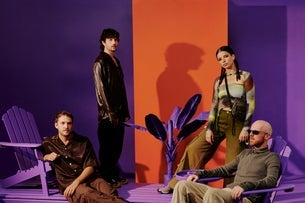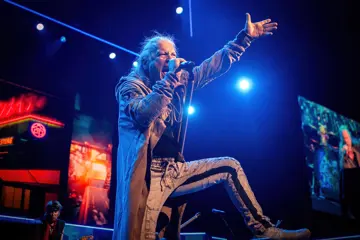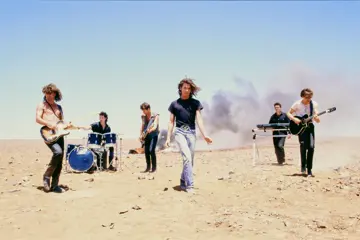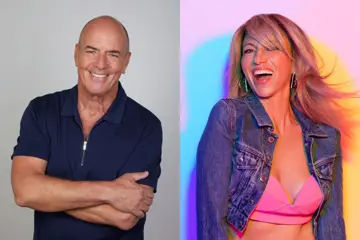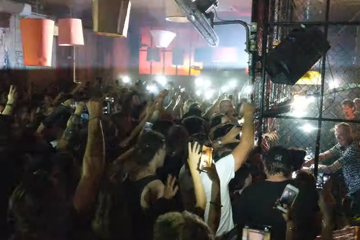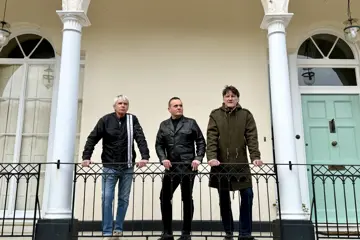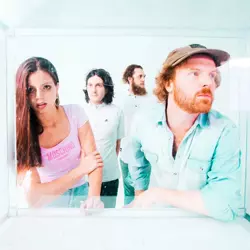 The Jungle GiantsIt's been a steadily skywards pointing career trajectory to date for young Brisbane four-piece The Jungle Giants. Their carefree brand of pop-infused indie rock has really touched a nerve with the Australian music public, with substantial radio play for their breezy tunes quickly translating into not only large crowds for their own live shows but also consolidating them a role as firm festival favourites, the band rocking the stages of high profile local events such as Splendour In The Grass, Big Day Out, Groovin' The Moo and One Night Stand (as well as some esteemed overseas gatherings like SxSW).
The Jungle GiantsIt's been a steadily skywards pointing career trajectory to date for young Brisbane four-piece The Jungle Giants. Their carefree brand of pop-infused indie rock has really touched a nerve with the Australian music public, with substantial radio play for their breezy tunes quickly translating into not only large crowds for their own live shows but also consolidating them a role as firm festival favourites, the band rocking the stages of high profile local events such as Splendour In The Grass, Big Day Out, Groovin' The Moo and One Night Stand (as well as some esteemed overseas gatherings like SxSW).
Now, having gained a swag of traction with their debut long-player Learn To Exist (2013) - which debuted at #12 on the ARIA Album Charts and #1 on the AIR Chart - they're back with follow-up album, Speakerzoid (which aptly takes its strange title form a misheard Sonic Youth lyric). Overseen once again by esteemed producer Magoo (who helmed their debut), it's an assured evolution of The Jungle Giants' aesthetic, with a focus on upbeat, dance-inducing rhythms and their trademark rampant melodies - it's still very much the same band, they've just taken one seismic step forward.
"I decided to go on a writing trip and just went to Paris for a couple of weeks and locked myself in an apartment."
"We definitely didn't want to do the same thing again," reflects frontman and chief songwriter Sam Hales. "We didn't want to get pigeonholed as a band who would do exactly the same thing every time, because we're not actually like that - we just started with one thing and now we're going somewhere else - so Speakerzoid is like a step towards where we want to be going. After Learn To Exist I went through a little block there where I didn't write as much as I usually would; I kinda just thought about it a lot. It wasn't really writer's block because I was still writing, but I was looking for something else to start working on - something a bit different and a little more challenging.
"So in the year after Learn To Exist came out I was just writing and thinking about what I wanted to do, and then I decided to go on a writing trip and just went to Paris for a couple of weeks and locked myself in an apartment. It was just to shake things up a bit and figure out what I was looking for in terms of a new project, and we ended up with Speakerzoid. We like music that you can dance to and sing along to - pop music basically - but I wanted to put a twist on it. The span of influence in terms of what I was listening to just exploded after Learn To Exist; before Learn To Exist I had never heard Jeff Buckley or Beck or Caribou or fucking anyone!"
Don't miss a beat with our FREE daily newsletter
"[Sam] picked up heaps of jazz influences as well, and Latin and folk music and stuff like that," continues bass guitarist Andrew Dooris. "[He] got deep into music and had a new band he was excited about every second day. Sam just wrote and wrote and wrote, but it wasn't so much writing songs as making coherent ideas - he'd come to us with coherent ideas even though they weren't fully-fledged songs. So coming into the album Sam probably worked more on the pre-studio side of things whereas the rest of us probably worked less, and we worked harder in the studio to make it all sound connected. I think production really played a huge role in this album; we took more of a focus on creating interesting sounds that would mesh together."
Despite this shared input, Dooris draws the line at claiming that Speakerzoid's genesis was wholly collaborative.
"That might be taking too much credit," he laughs. "Sam is basically a genius in my brain, but between Keelan [Bijker - drums], Cesira [Aitken - guitar], myself and Magoo we're all refiners, and we'd try to simmer down the core of everything and try to make it stomach-able and make sense."
"This time around we did less with the pre-production, because the idea was that we would bring all these blocks of songs that we'd bring to the studio - we had a list of songs that we wanted to work on," Hales offers. "With Learn To Exist we did a lot of pre-recording work, we just played every song a thousand times and then just went into the studio and recorded it. This time we kinda went, 'Let's do all this pre-production while we're doing it', so we went in and we'd play the song and then we'd go, 'I want to put this in here, I want to rework this bit', so it was way more collaborative in that way. Also the album this time came out sounding like all the songs were from the same album, unlike Learn To Exist - we wanted to make it sound like an album rather than ten songs just cobbled together."
"I hope what Speakerzoid will do is give people an idea that we do fucking get aggressive live."
Despite the success of their lauded debut, neither Hales nor Dooris believe that The Jungle Giants felt any more pressure when it came time to making Speakerzoid.
"We knew that we could just do the same album again," the singer muses. "We could follow that same structure and just do Learn To Exist 2, but we didn't really want to so for us it just became the simple decision, 'Let's make good music again, just new good music'. So one decision was to not make it the same and not pigeonhole ourselves but still make fucking good music."
"I actually think pressure-wise there was way more leading into the initial release, because with Learn To Exist I think all of us freaked out at maybe different points, thinking, 'This is our debut album and you only get one chance to make your debut album', and I think that was a way bigger stress than the second release, 'Oh no, we've got to do this again'," the bassist offers. "I think at the end of the day we had a lot of trust in our fans, and we've always connected more with our fans in a live setting anyway.
"The shows that we played after the first album were such a confirmation, and what it really meant to us was that we had to keep doing it for them and for us - we have to keep growing with these people. We wanted to stay connected to them, and the only way to do that was by being proud of the work that we're doing, and we would never have been proud doing that same album twice. Also it was a relief getting that first album out and knowing that it just happened as it happened; we didn't become number one hits or anything like that, we did exactly what we needed to do and it was a relief just knowing that it was possible. That was ultimately more liberating than anxiety-inducing."
And even from their earliest forays the live realm has been an important part of The Jungle Giants' armoury.
"I think a big thing with Speakerzoid - which for me anyway is something I think it can do and should do and will do - is give something more to expect when they come to our shows," Hales admits. "I remember for the first two years of touring Learn To Exist a friend of ours would see us for the first time - or someone would see us for the first time - and every single time they'd be, like, 'I had no idea you guys played so hard, or didn't just play soft'. So what we were essentially doing - especially with songs like [2011 first single] Mr Polite, which is a sugary kinda song - we would just put a shitload of beef on it when we played and we'd be quite aggressive, and that would surprise people. So I hope what Speakerzoid will do is give people an idea that we do fucking get aggressive live, and it adds to our repertoire with these long, building songs that you can just kind of jive to the whole time."
Of course an album needs lyrics, and fortunately Hales had plenty of recent inspiration to draw upon.
"I guess there was a theme, because a lot of the lyric writing happened in the studio," he smiles. "I guess a big theme was about my new girlfriend Grace; we'd been going out long-distance for a year-and-a-half because she was living in Sydney, but she just moved to Brisbane. A lot of the lyrics are about finding a proper girlfriend who isn't just a stupid, 17-year-old fuck up - it was, like, 'Wow, I've become a human now!' - so there's a lot of lyrics about that I guess."

